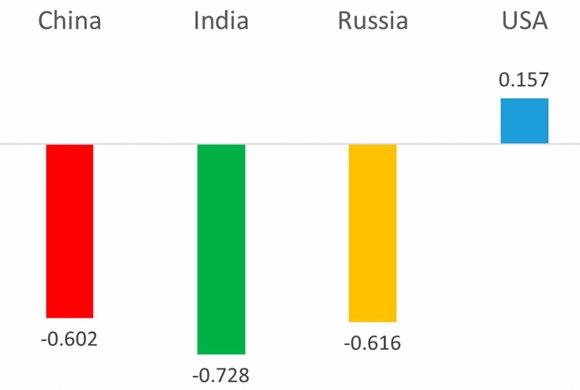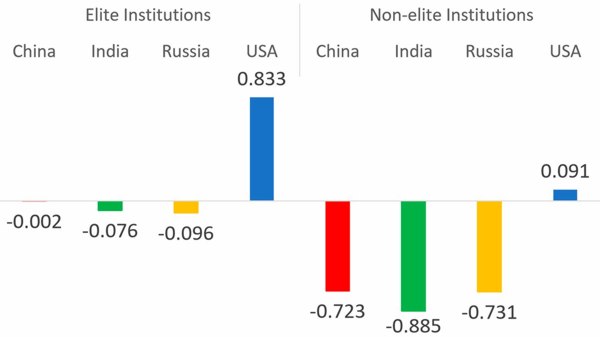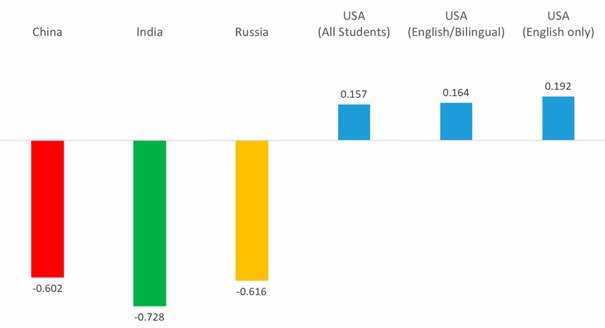| US Computer Science Is World Beating |
| Written by Janet Swift | |||
| Monday, 25 March 2019 | |||
|
Final-year computer science undergraduates in the US substantially outperform their counterparts in China, who surpass those in Russia, who do better than those in India. Males do moderately better than females in all four countries. These findings come from a report published in the Proceedings of the National Academy of Sciences of the United States of America of a study undertaken by a large team of researchers led by Prashant Loyalka, an assistant professor at Stanford University. Noting a recent expansion in undergraduate computer science programs, the introduction to the paper states: Despite rapid increases in the quantity of CS students and graduates, however, little is known about their quality. In particular, little is known about the major-specific competencies, knowledge, and skills (henceforth “skills”) of individuals from different countries and types of CS programs. To rectify this omission the researchers administered the Major Field Test in Computer Science, a 2-hour exam that was developed by the U.S. Educational Testing Service, to students in four countries: United States, China, Russia and India. The 2-hour exam, which assesses skills in algorithms, programming, software engineering, computer architecture, operating systems and networking, among other topics. was translated for the students in China and Russia. The team constructed a sampling mechanism to select senior (typically fourth year) computer science or equivalent students in each of the four countries, making sure that both the educational institutions and students enrolled at those schools were statistically representative of the respective nations' schools and computer science students. The sampling also ensured that study participants represented both elite and non-elite universities. The final selection included 6847 students from the US, 678 from China, 364 from India, and 551 from Russia. The exam scores are presented as standard deviations from the overall mean, standardized to be zero. The main finding is that Seniors in the United States exhibit much higher levels of CS skills than seniors in the other three countries while differences in CS skills between seniors in China, India, and Russia are small and statistically insignificant. Comparing the scores achieved by seniors at elite institutions with those from non-elite programs, seniors in elite programs score much higher than seniors in non-elite programs in China, India, and Russia, but they still score lower than seniors in the United States. Seniors from elite program in the United States score much higher than seniors from elite programs in the other three countries: One issue that the researchers anticipated was that US universities could be benefiting from the presence of the best foreign students, who inflate its scores. To correct for this they looked at the difference between non-English, bilingual and English only speakers and found it has an insignificant effect: Another issue the researchers looked at was the gender gap between males and females and discovered that in all countries, males outperformed females: Gender
despite the substantial focus of policymakers and researchers on gender inequality in CS, within-country gender gaps in skills are moderate compared with skill gaps across countries or programs. The gender gap in skills does indicate that more effort is needed to attract higher-achieving female students into CS and ensure that they have equal opportunities to receive a quality education. A main finding from the study, from the point of view of US computer science professions is also stated in the report: The results, when viewed in the context of the number of CS graduates emerging from different CS programs across countries, have implications for the global supply of computing professionals. The ∼65,000 CS graduates from the United States are outnumbered, but are much more skilled, on average, than the graduates from China (∼185,000), India (∼215,000), and Russia (∼17,000) United States graduates only face competition from a much smaller cadre of elite program graduates in China (∼33,000), India (∼8,000), and Russia (∼4,000). A substantial number of CS graduates from selective programs in the United States further face little competition, even from the other countries’ elite programs. More InformationWho Trains the Best Computer Scientists? Cross-National Evidence from China, India, Russia, and the U.S. Related ArticlesHackerRank Reveals Where To Find Programming Talent Where To Find Top U.S. Developers Indian Progammers Aren't Being Prepared For Real World Coding Russian Students Break Contest Records To be informed about new articles on I Programmer, sign up for our weekly newsletter, subscribe to the RSS feed and follow us on Twitter, Facebook or Linkedin.
Comments
or email your comment to: comments@i-programmer.info |
|||
| Last Updated ( Wednesday, 27 March 2019 ) |




 With regard to the consistent gender gap, Loyalka et al. make the comment:
With regard to the consistent gender gap, Loyalka et al. make the comment: 
